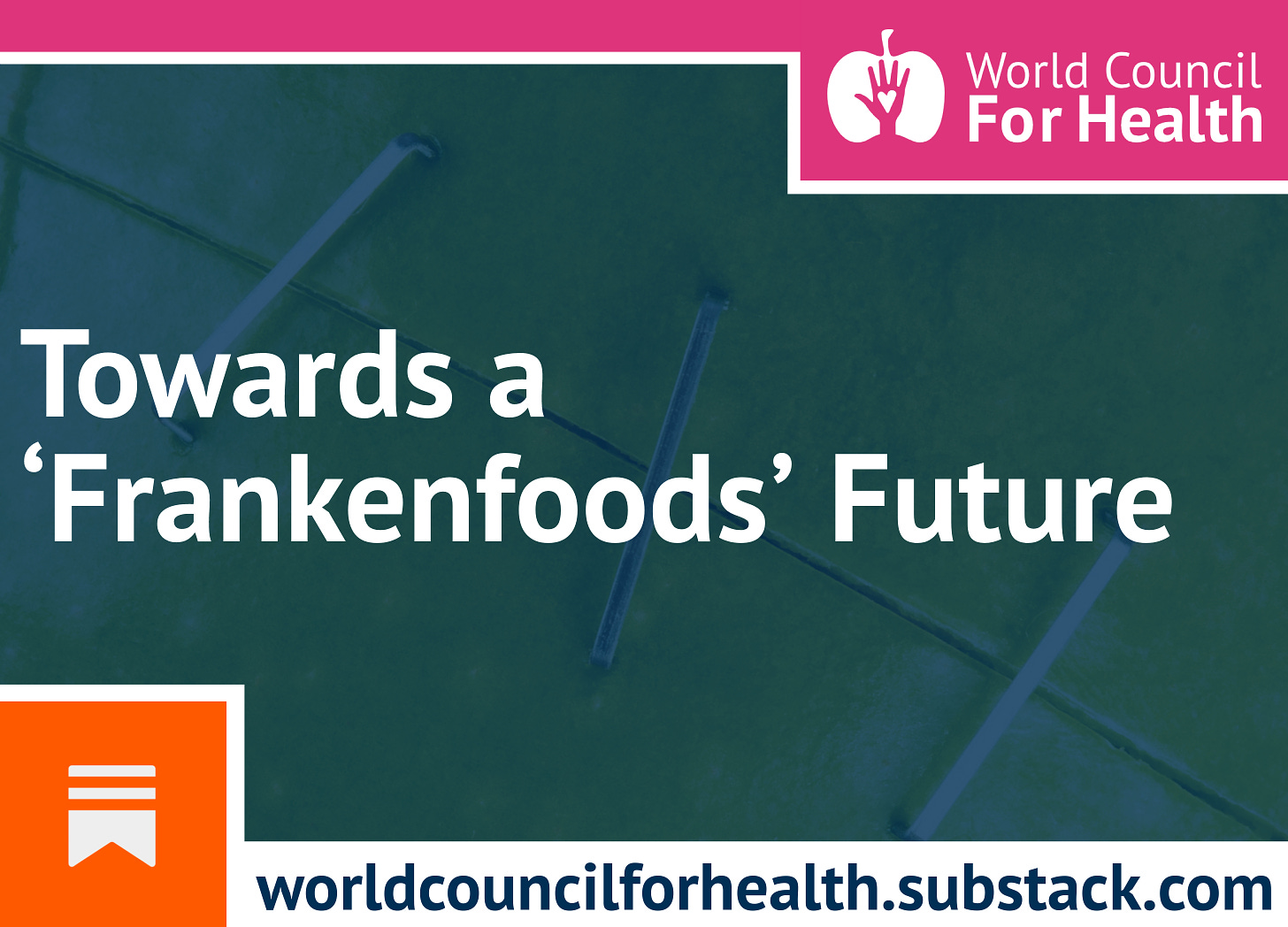Towards a ‘Frankenfoods’ Future
The adulteration of food for commercial purposes has a long history. Today, processed foods have replaced natural foods in the majority of shopping carts in so-called ‘developed’ countries.
Lawyer Alexis Baden-Mayer is Political Director of the Organic Consumers Association, a US-based organisation advocating for consumers' rights to safe, healthful food and other products; a just food and farming system; and a biodiversity-rich environment, free of pollutants. One of the many programmes she coordinates is the Real Farms Not Fake Food campaign. Its two interlocking aims are:
to stop mega-corporations, through the World Economic Forum (WEF), driving farmers off their land, and
to stop the replacement of natural foods with synthetic, genetically engineered molecules.
During Better Way Today on 4 March 2024, Alexis traced the historical roots of these issues with World Council for Health (WCH) Steering Committee member, Christof Plothe DO. In Part 2 of this two-part article we find out that our current concerns about synthetic foods have a long history. Part 1 deals with the loss of family farms and you can find it here.
Watch the full episode on our website.
Part 2: Towards a ‘Frankenfoods’ future
School lunches and soy burgers
The adulteration of food for commercial purposes has a long history. In 1971, Archer Daniels Midland, the largest grain buyer and processor in the United States, got the school lunch programme to allow them to include 30% soy in any product or menu item containing beef. While these products were not genetically modified, they contained ultra-processed, unhealthy defatted soy, and children eating them grew up not knowing what hamburgers were supposed to taste like! Today, processed foods have replaced natural foods in the majority of shopping carts in so-called ‘developed’ countries.
Lab-grown meat is not a new idea
A sinister eugenicist thread runs through the history of the development of lab-grown food. In 1912, a Rockefeller Institute scientist and eugenicist, Alexis Carrel, developed a technique for keeping embryonic chick heart cells alive indefinitely in tissue culture, an essential technology required to produce lab-grown meat. Prior to becoming the UK Prime Minister, Winston Churchill was advised by a Rockefeller-funded eugenicist, Frederick Lindeman, and became a proponent of synthetic food. Even then, he understood that the technology existed to have microbes produce synthetic foods that are practically indistinguishable from real food. In 1931, he predicted that the food industry would introduce these changes so gradually that they would escape observation.
The very first synthetic food eaten by humans was coal butter made by the Nazis. This was disclosed when British soldiers discovered a factory in Germany producing butter from coal as a byproduct of synthetic rubber production. Again the Rockefellers were involved. Being invested in fossil fuels, they partnered with the German company IG Farben to manufacture synthetic rubber – ironically keeping the technology away from the US military. IG Farben (now Bayer) ran Auschwitz, building it up into a huge industrial complex for the production of synthetic rubber from coal. The chemical process also produced oils and fats, which they made into an edible synthetic butter. The Nazis trialled this ‘coal butter’ on concentration camp prisoners and later fed it to their U-boat crews. After the war it was promoted to a wider market, but it was rejected by the US Congress because of the threat posed to US farmers.
Regarding current efforts to replace conventional meat such as chicken with lab-grown equivalents, Alexis is not particularly concerned. So far only the US and Singapore have approved lab-grown chicken, and it has proven very difficult to bring it to scale, with only one restaurant in San Francisco is offering a few servings of lab-grown chicken per week.
Similarly, Alexis sees the WEF’s plans for us to ‘eat bugs’ as a distraction: the greater threat is not just alternative sources of animal protein, or genetically modified corn and soy, but entirely synthetic food. This is the world of ‘synthetic biology’ or SynBio.
The brave new world of synthetic biology
The science of SynBio is based on what the industry calls precision fermentation: taking genetically modified yeast, fungi, or E. coli bacteria, and getting the microbes to produce a protein that looks, feels, and tastes like milk or meat, for example. Prior to its use in the food industry, this technology was used to produce nutritional supplements. Despite the move to ‘precision fermentation’ of tryptophan resulting in a number of deaths and permanent disabilities, the United States and Singapore have since approved the use of SynBio in the food industry. In 2021 the US Department of Agriculture awarded the company Impossible Foods a child nutrition label, making them eligible for national school lunch funding.
SynBio milk was approved in the USA in 2020. It is a non-animal whey protein made by the company Perfect Day and used by other brands as an ingredient; for example, Archer Daniels Midland uses it to increase the protein content of protein powders used by food service companies and in multi-ingredient processed foods. While advertised as 100% whey protein, research by Dr John Fagan has revealed the presence of more than 90 different undisclosed molecules in the product, some of them new to science. So, where did these substances come from?
The genetically modified microbes that produce the whey protein are grown in large vats. To prevent contamination, fungicides and antibiotics are added to the mixture. When the whey protein is extracted, it can be contaminated with these substances, as well as the genetically modified microbes themselves. The Organic Consumers Association is working with Dr Fagan to get to the bottom of this issue.
A plan to destroy meat and dairy
In 2019, the SynBio industry funded a think tank called RethinkX, which put together a report predicting “the collapse of US dairy and cattle industries by 2030 as animal meat is replaced by cheaper, higher-quality food made from precision fermentation protein.”
Based on her experience, Alexis predicts that RethinkX will choose to focus on two key SynBio products: synthetic blood (haeme) and synthetic whey protein. The food industry will then use these products as ingredients in processed foods, replacing meat and milk wherever possible. In addition to ensuring huge profits for the industry, the shift to SynBio is likely to hasten the demise of the family farm.
Don’t get distracted
Alexis pointed out that we shouldn’t get distracted by high-profile stories about eating crickets and ouroboros steak. “If we keep focused, we can beat these things back. We still do have a regulatory system that protects us to a certain extent,” she says. And it is encouraging to know that Impossible Foods gave up their petition to the European food safety authorities and are no longer seeking approval in Europe.
The Non-GMO Project, with its butterfly logo, and the USDA Organic seal help people make healthy food choices.
For those concerned about the future our children and grandchildren will inherit, Alexis shared this encouragement:
…the thing that we have on our side is that real life and real food is delicious and it brings us bliss. … if we can give our children opportunities to experience life outside and real food and real life, hopefully once their brains fully develop … they'll be able to make the right choice. So we just have to keep pulling people out of the matrix and keep these pockets of real food and real life alive.
It's up to all of us to defend that which is good, true and beautiful, both in humanity and in the natural world.
Let’s give Christof the last word:
Watch the full interview on our website.
If you find value in this Substack and have the means, please consider making a contribution to support the World Council for Health. Thank you.








¨Journalists Jane Akre and Steve Wilson were fired by the Fox News television station they work for after refusing to change their investigative report on Posilac, a Bovine Growth Hormone (BGH) made by Monsanto. Their research documents potential health and safety problems of drinking milk treated with the synthetic hormone, but threatened with legal action from Monsanto, Fox wants the negative effects played down. The court eventually throws out Akre's whistle blower lawsuit after deciding that the media is allowed to lie.¨
Monsanto & Cancer Milk: FOX NEWS KILLS STORY & FIRES Reporters. 10:20 min
https://www.youtube.com/watch?v=JL1pKlnhvg0
The Seeds of Vandana Shiva
We will continue to create a new world -seed by seed, person by person, community by community - until this planet is embraced by resurgent life and resurgent love. Vandana Shiva
https://vandanashivamovie.com/
The Seeds of Vandana Shiva Trailer
https://www.youtube.com/watch?v=YEqTo8lDivs&t=2s
'Bill Gates is continuing the work of Monsanto', Vandana Shiva tells FRANCE 24 10:15 min
¨Our guest is Vandana Shiva, a world-famous environmental activist from India. Her latest book is entitled "One Earth, One Humanity vs. the 1%". She tell us about more her opposition to big multinationals such as Monsanto for their nefarious influence on agriculture. But Shiva also singles out billionaires like Bill Gates and Mark Zuckerberg for criticism. "When Bill Gates pours money into Africa for feeding the poor in Africa and preventing famine, he’s pushing the failed Green Revolution, he’s pushing chemicals, pushing GMOs, pushing patterns", she tells FRANCE 24's Marc Perelman.
https://www.youtube.com/watch?v=MNM833K22LM